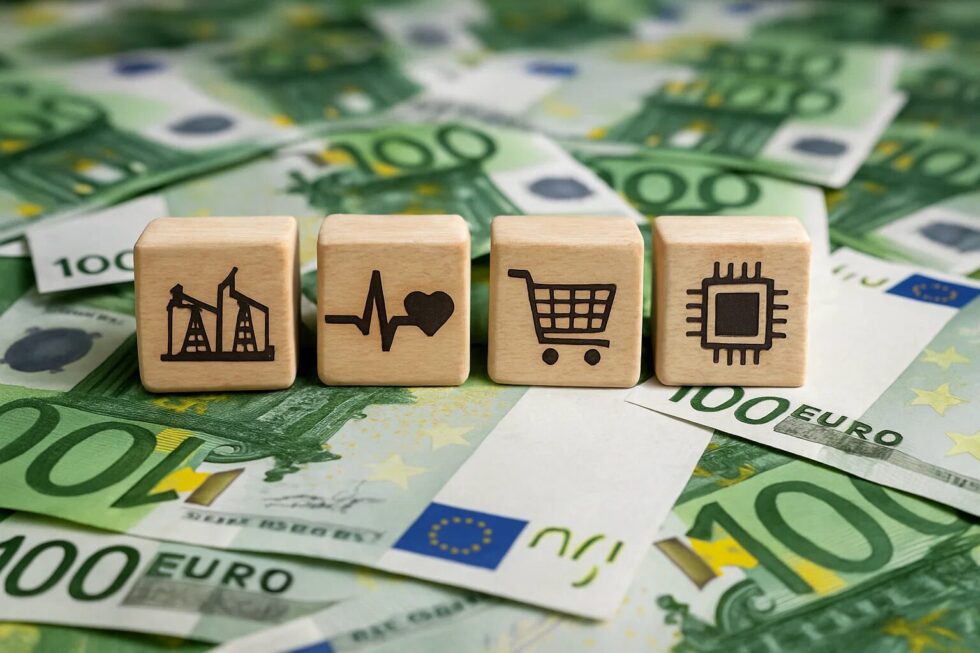The most profitable industries in Germany in 2025 show how Europe’s strongest economy is evolving under the influence of digitalization, green policies, and demographic changes. Entrepreneurs who want to succeed must carefully select sectors where demand is rising and government support is available. Germany’s federal and state-level programs provide billions in subsidies, loans, and tax incentives to promote innovation and stability. Sectors like technology, renewable energy, healthcare, logistics, food, tourism, and fintech are all experiencing above-average growth rates. Starting a company in these areas requires understanding capital needs, regulatory requirements, and competition. The right approach combines careful planning with strong networking in local hubs and accelerators. This overview explains where the best opportunities lie in 2025, as highlighted by G.business.
Technology and artificial intelligence
Technology and AI remain at the core of Germany’s economic strategy in 2025. The government has committed billions to fund digitalization, cybersecurity, and artificial intelligence, making it one of the most profitable areas for startups and established companies. Berlin, Munich, and Frankfurt have become global hotspots for AI research and applications, with venture capital funds increasingly flowing into these cities. Companies developing solutions for automotive, healthcare, finance, and manufacturing can secure strong revenue streams. AI-driven automation reduces costs for SMEs, while cloud computing services are critical for mid-sized firms that dominate the German economy. Cybersecurity has also become essential, especially for banks and government institutions. Germany’s position as a leading data hub in Europe makes it particularly attractive for entrepreneurs entering AI or IT infrastructure markets. The sector’s annual growth exceeds 12%, creating long-term potential for investors and innovators.
Key opportunities in tech and AI:
- Development of AI-driven software for SMEs.
- Cybersecurity solutions for banks and government.
- Cloud infrastructure services for Mittelstand firms.
- Smart manufacturing and robotics for Industry 4.0.
- Data centers and IT hubs in Frankfurt.
Renewable energy and green technologies
Germany is a pioneer in renewable energy and continues to expand this sector rapidly in 2025. The country’s Energiewende (energy transition) aims for full carbon neutrality by 2045, creating billions in investment opportunities. Solar and wind power projects are expanding across Northern Germany, while hydrogen is considered the next big driver of industrial growth. Federal institutions like BAFA and KfW provide loans covering up to 70% of renewable installations, making it easier for small companies to enter the market. Energy consulting services are in high demand as businesses are required to meet new efficiency standards. Recycling and upcycling of renewable equipment is also growing, supported by EU circular economy goals. Entrepreneurs who position themselves in solar installation, wind turbine maintenance, or hydrogen logistics are expected to see double-digit growth. The renewable energy sector combines profitability with long-term policy stability, making it one of the safest industries for 2025.
Main sub-sectors in renewables:
- Solar panel installation and maintenance for residential and commercial clients.
- Offshore and onshore wind projects, especially in Northern Germany.
- Hydrogen production and storage technologies.
- Recycling and upcycling of renewable equipment.
- Energy efficiency consulting for SMEs and municipalities.
Healthcare and eldercare
Germany’s healthcare and eldercare sectors are expanding rapidly due to demographic trends. By 2030, more than 30% of the population will be over 60, making services for seniors a necessity rather than an option. In 2025, telemedicine and digital healthcare platforms continue to grow under the federal “E-Health Act,” which encourages digital medical records and remote diagnostics. Private eldercare agencies are booming in urban centers like Hamburg, Cologne, and Stuttgart, where the demand for in-home nursing has outpaced supply. Rehabilitation centers, physiotherapy practices, and preventive health startups also see strong demand from both older and younger patients. Germany’s health insurance system ensures that medical expenses are partially covered, giving private providers a stable flow of customers. Digital health startups are supported by both private investors and state innovation grants. The sector offers steady growth with high social impact, making it a top choice for entrepreneurs.
Profitable healthcare niches:
- Telemedicine platforms with certified German data protection.
- Private eldercare and nursing home services.
- Physiotherapy and rehabilitation centers.
- Preventive health, nutrition, and wellness startups.
- Development of medical devices and assistive technologies.
Logistics and e-commerce
Germany’s central location makes it Europe’s logistics powerhouse, and in 2025 the sector remains one of the most profitable. With world-class infrastructure such as Hamburg Port, Frankfurt Airport, and the Rhine-Ruhr corridor, logistics companies handle billions in trade annually. The rise of e-commerce continues to fuel demand for last-mile delivery, warehouse automation, and cold-chain solutions. Large platforms like Amazon.de and Zalando set the standard, but SMEs can succeed by specializing in niche services. The government supports green logistics initiatives, offering subsidies for electric delivery vehicles and digital supply chain solutions. Startups focusing on AI-driven logistics software have strong chances of attracting investment. The annual logistics turnover surpasses €300 billion, and growth remains steady at 8–10%. This makes logistics one of the safest and most profitable sectors for entrepreneurs entering Germany.
Top logistics opportunities in 2025:
- Warehouse automation and robotics.
- Cold-chain logistics for pharmaceuticals and food.
- Green last-mile delivery using e-bikes and electric vans.
- Cross-border fulfillment centers for e-commerce.
- Software solutions for supply chain transparency.
Tourism and hospitality
Tourism in Germany is recovering strongly and adapting to new consumer trends in 2025. More than 40 million international visitors and millions of domestic travelers support this sector. Demand is shifting toward eco-tourism, cultural experiences, and wellness retreats, particularly in the Black Forest, Bavarian Alps, and Baltic coast. Major cities like Berlin, Munich, and Dresden remain cultural hotspots, while business travel to Frankfurt, Hanover, and Düsseldorf boosts the conference and events market. Sustainable hotels and culinary tourism are becoming highly profitable niches, as Germans and international visitors are willing to pay for authentic, environmentally responsible experiences. The federal and state governments continue to invest in regional tourism development, making it easier for entrepreneurs to launch innovative projects. Digital booking platforms, boutique hotels, and local tour companies are thriving in 2025. With steady growth and moderate entry costs, tourism remains attractive for both small and mid-sized investors.
Promising fields in tourism:
- Sustainable eco-hotels and wellness lodges.
- Culinary tours with regional specialties (wine, beer, cheese).
- Digital booking and experience platforms.
- Event management for conferences and trade fairs.
- Local adventure tours (cycling, hiking, history).
Food industry and alternative proteins
The German food industry is undergoing transformation as consumers demand healthier, more sustainable products. In 2025, plant-based proteins, organic goods, and lab-grown meat are among the fastest-growing niches. Retail giants like REWE and EDEKA have expanded vegan and organic product lines, while startups in Berlin and Hamburg attract international investment for food-tech innovations. SMEs can enter the market with relatively low capital compared to tech or energy sectors, making it attractive for smaller entrepreneurs. Subscription-based delivery services for organic food are gaining popularity among urban families. Export opportunities are also strong, particularly for certified organic products to Scandinavia and the Benelux region. Restaurants and cafés specializing in vegan cuisine have become mainstream, especially in Berlin and Cologne. With growth rates of around 10% annually, the food sector combines consumer demand with global expansion opportunities.
High-potential food niches:
- Vegan and plant-based food production.
- Organic and local food delivery subscriptions.
- Food-tech startups focusing on lab-grown meat.
- Specialty restaurants and cafés.
- Export of German organic products abroad.
Finance and fintech
Germany’s finance sector remains one of Europe’s strongest, with Frankfurt serving as the continent’s financial capital. In 2025, fintech companies specializing in blockchain, digital banking, and insurtech are thriving. The regulator BaFin has introduced a “sandbox” environment for startups, lowering entry barriers and encouraging innovation. Berlin is also a top fintech hub, with many international startups choosing the city as their base. Investors show strong interest in mobile-first banks, peer-to-peer lending, and AI-driven wealth management platforms. Crypto services, although strictly regulated, are gaining ground among younger consumers. Crowdfunding platforms are also becoming an important financing tool for SMEs. Fintech’s annual growth of around 11% makes it one of the most dynamic industries in Germany.

Promising fintech directions:
- Digital banks and financial apps.
- Blockchain-based payment and identity solutions.
- Insurtech platforms for health and car insurance.
- Peer-to-peer lending and crowdfunding.
- AI-driven financial advisory services.
Comparison of top industries in 2025
| Industry | Growth rate 2025 | Entry capital needed | Main hubs |
|---|---|---|---|
| AI & Tech | 12%+ annually | €50,000–€500,000 | Berlin, Munich, Frankfurt |
| Renewable energy | 10–15% | €100,000–€1m | Hamburg, NRW, Bavaria |
| Healthcare & eldercare | 9% | €30,000–€250,000 | Nationwide |
| Logistics & e-commerce | 8–10% | €50,000–€500,000 | Rhine-Ruhr, Hamburg |
| Tourism & hospitality | 7% | €20,000–€200,000 | Berlin, Munich, Dresden |
| Food industry | 10% | €20,000–€300,000 | Berlin, Hamburg, Cologne |
| Fintech | 11% | €100,000–€1m | Frankfurt, Berlin |
Business hubs and incubators in Germany
Germany offers many incubators and innovation hubs that support entrepreneurs in every sector. Choosing the right hub can mean faster access to funding, mentorship, and networks. In technology, Berlin’s Factory Berlin and Munich’s UnternehmerTUM are global leaders. Renewable energy startups thrive at GreenTech Alliance in Berlin and Hamburg’s EEHH Cluster. Healthcare innovators join Medical Valley EMN or Flying Health in Berlin. Logistics entrepreneurs work with Digital Hub Logistics Hamburg and Fraunhofer IML Dortmund. Food startups use ProVeg Incubator and Food Campus Berlin. Fintechs connect through TechQuartier Frankfurt, FinLeap Berlin, and MainIncubator by Commerzbank. Each hub provides a mix of office space, training, and direct investor contacts. For international entrepreneurs, these hubs are the fastest entry point into Germany’s competitive business scene.
Practical tips for entrepreneurs
Starting a business in Germany requires planning beyond just choosing the right sector. Entrepreneurs should register with the local Gewerbeamt (trade office) and Finanzamt (tax office), which usually costs between €20–€60 for registration. New firms must consider VAT obligations, corporate tax, and, in some cases, BaFin licensing for financial services. Using KfW and BAFA subsidy programs is essential, as they provide low-interest loans and grants for startups. Networking with local chambers of commerce (IHK) and startup hubs increases credibility and market access. Sustainability should be integrated into the business model, as German customers value eco-friendly practices. Building trust through certifications like Bio-Siegel or TÜV also helps in industries like food and tech. Foreign entrepreneurs benefit from startup visas, but they must provide a solid business plan and financial projections.
Stay connected for news that works — timely, factual, and free from opinion — and insights that matter now: What Is Link Building: 9 Common Mistakes and How to Avoid Them
